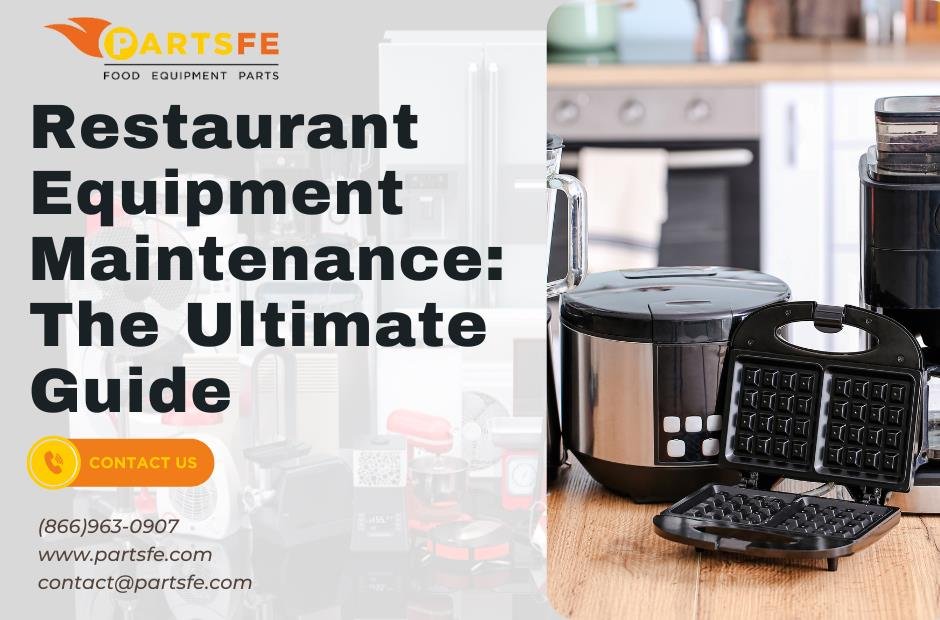Have you ever wondered what keeps the kitchens of your favorite restaurants running smoothly day in and day out? The answer lies in meticulous restaurant equipment maintenance. In this comprehensive guide, we delve into the crucial art of maintaining the restaurant equipment, unveiling its pivotal role in sustaining the culinary industry’s heartbeat. Whether you are looking to extend the lifetime of your equipment or maintain optimal food quality, we’ll reveal the undeniable benefits of proper maintenance.
Types of Restaurant Equipment
Restaurants rely on a variety of equipment to ensure smooth operations and the delivery of high-quality dishes. Here are the different types of standard restaurant equipment’s
Kitchen Appliances:
These encompass a range of devices like commercial fryers, stoves, ovens, grills which form the backbone of any restaurant’s kitchen. They facilitate cooking and heating processes, allowing chefs to prepare a diverse array of dishes with precision.
PartsFe is your one stop shop for all your commercial kitchen equipment needs. We offer a wide range of oven, ice machine, griddle, dishwasher, plumbing and grill parts from top-selling brands at affordable pricing.
Food Preparation Equipment:
From mixers and slicers to food processors and blenders, these tools streamline the preparation of ingredients. They help in chopping, mixing, blending, and transforming raw materials into usable components for various recipes.
Dishwashing and Cleaning Equipment:
Maintaining hygiene is crucial in the food industry. Dishwashers, sinks, and cleaning stations assist in efficiently washing and sanitizing dishes, utensils, and kitchen surfaces, ensuring a safe and sanitized environment.
Restaurant Equipment Maintenance Checklist
Given below is the restaurant equipment maintenance checklist to be followed for smoothing functioning of the equipment:
Convection Oven Maintenance
Maintenance of convection ovens significantly impacts kitchen efficiency.
Daily: Clean the oven chamber after each use.
Monthly: Conduct a monthly deep cleaning, and inspect door seals and hinges.
Quarterly: A quarterly comprehensive professional inspection should cover to replace an oven element and other electrical connections.
Refrigerator Maintenance
A restaurant’s refrigerator is a vital workhorse that operates non-stop, underscoring the importance of regular maintenance.
Daily: Wipe down the equipment and inspect for visible wear and tear. Thoroughly clean both the interior and exterior to ensure efficient functioning.
Monthly: Conduct a more in-depth cleaning session. Pay special attention to the cleanliness and condition of the door gaskets, crucial for maintaining proper refrigeration.
Quarterly: Engage a certified contractor to perform a comprehensive check. Evaluate the condenser coils, evaporator, and check for any potential leaks.
Fryer Maintenance
Fryers, subject to constant heat and oil exposure, necessitate vigilant maintenance to prevent kitchen fires.
Daily: Perform end-of-day cleaning, ensuring the grease filters are clear. Consider utilizing a used cooking oil recycling service.
Monthly: Carry out a thorough cleaning process. Inspect heating elements for signs of damage.
Quarterly: Enlist a qualified contractor for an in-depth inspection of the fryer’s internal components.
Griddle and Range Top Maintenance
The surfaces of cooking equipment like griddles and range tops are extensively used and demand regular upkeep.
Daily: Wipe down surfaces after each use, ensuring no food residue remains.
Monthly: Assess for signs of wear and tear and perform a more thorough cleaning routine.
Quarterly: opt for a professional service check that covers gas connections and ventilation systems.
Walk-In Freezer Maintenance
Walk-in freezers play a pivotal role in preserving food quality and require proper care.
Daily: Regularly sanitize and check the door seals for integrity.
Monthly: Defrost and deep clean, while inspecting for visible damage.
Quarterly: Engage a qualified contractor to inspect refrigeration equipment, including coils and refrigerant levels.
Combi Oven Maintenance
Complex combi ovens demand routine maintenance to avert breakdowns.
Daily: Wipe down equipment and check for visible wear.
Monthly: Follow the manufacturer’s instructions for a thorough chamber cleaning.
Quarterly: Schedule a professional service check to inspect electrical components and calibrate the oven if necessary.
Ice Machine Maintenance
Ice machines can harbor bacteria if not properly maintained.
Daily: Wipe down the exterior and clean ice-making components as needed.
Monthly: Sanitize the ice storage bin and check the water filter.
Quarterly: Arrange for a professional deep cleaning and maintenance check.
Dishwasher Maintenance
essential for health codes, dishwashers must be well-maintained.
Daily: Clean the interior and exterior, checking for visible issues.
Monthly: Perform a deep clean and inspect spray arms and filters.
Quarterly: A professional inspection should encompass water temperature and pressure checks.
Stand Mixer Maintenance
Regular upkeep of this versatile equipment enhances efficiency and saves costs.
Daily: Clean after each use and check for visible damage.
Monthly: Lubricate moving parts and inspect for unusual noises.
Quarterly: Schedule a professional service check-up to ensure all components function correctly.
Benefits of Commercial Kitchen Equipment Maintenance
Regular commercial kitchen maintenance offers a range of advantages. Let us look at them
Save Money: Scheduled equipment maintenance prevents unexpected and costly repairs. Detecting and addressing minor issues early on prevents them from escalating into major problems, ultimately reducing repair expenses and the need for premature equipment replacement.
Increases Equipment Lifespan: Well-maintained equipment outlasts neglected counterparts. Routine check-ups and daily cleaning prevent minor problems from turning into major malfunctions, prolonging the lifespan of your kitchen equipment.
Higher Resale Value: Investing in equipment care pays off when it’s time to sell. Buyers are willing to pay more for well-maintained, functional equipment, ensuring a better return on your investment.
Enhances Operational Speed: Smooth-running equipment boosts kitchen efficiency. Regular maintenance ensures optimal performance, leading to faster operations and timely meal delivery, thereby elevating customer satisfaction.
Preserves Food Quality: Equipment condition directly affects food quality. Properly maintained appliances ensure even cooking, accurate temperature control, and better ingredient preservation, safeguarding the taste and excellence of your culinary creations.
Reduces Fire Risk: Kitchens are fire-prone environments. Regular maintenance, including cleaning and inspection, identifies and mitigates potential fire hazards, enhancing kitchen safety for staff and customers.
Promotes Hygiene: Sanitization is paramount in food service. Well-maintained equipment is easier to clean and sanitize, minimizing food contamination risks and ensuring compliance with health and safety standards, essential for a thriving restaurant.
Restaurant Equipment Troubleshooting and Common Issues
In the fast-paced world of restaurant operations, equipment breakdowns can bring the bustling kitchen to a standstill. Understanding common issues and troubleshooting techniques is crucial for ensuring seamless service. One frequent problem is faulty temperature regulation in refrigeration units, leading to potential food spoilage. Regularly cleaning condenser coils and checking door seals can alleviate this.
Malfunctioning commercial ovens can also disrupt kitchen workflow. Issues like uneven heating may result from faulty heating elements or improper ventilation. Routinely inspecting and cleaning these components can extend the oven’s lifespan.
Additionally, dishwashers encountering drainage problems can hinder dishwashing efficiency. Clogged filters and drain lines are often the culprits. Regular maintenance and proper loading techniques can prevent these issues.
Regular equipment maintenance, staff training, and swift action when issues arise are vital in a restaurant equipment solutions & setting. Collaborating with technicians and following manufacturer guidelines can minimize downtime, maximize efficiency, and uphold a smoothly functioning kitchen.
Prioritizing restaurant equipment maintenance is paramount for ensuring smooth operations and extending the lifespan of your valuable assets. By adhering to the comprehensive maintenance checklist provided above, you can mitigate breakdowns, enhance efficiency, and guarantee a seamless dining experience for your patrons.
FAQs
What does equipment maintenance include?
Equipment maintenance typically involves inspecting, cleaning, lubricating, and repairing components to ensure optimal functionality and prolong the lifespan of machinery and devices.
How often should equipment be maintained?
The frequency of equipment maintenance varies depending on factors such as usage intensity, manufacturer recommendations, and environmental conditions. Generally, regular scheduled maintenance is advisable to prevent unexpected breakdowns.
What is the best way to store kitchen equipment?
Storing kitchen equipment in a clean, dry, and organized manner is key. Use designated storage areas, avoid overcrowding, and consider using protective covers to prevent dust and moisture buildup, enhancing equipment longevity.
















